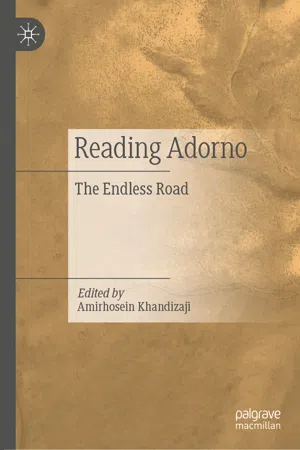Introduction
With the statement that “what is rational is actual and what is actual is rational”, Hegel unintentionally disclosed one of the most powerful facets of social imaginaries.1 Social imaginaries do not just instantiate meanings and purposes; they simultaneously enable perception of the world and instil a sense of confidence in the alignment between forms of understanding and being. Hegel’s statement is suffused with the assumptions of Western philosophical thought’s logic and ontology; it presumes that the truth of reality resides in rationality. This view is discontinuous with that of most other social imaginaries. Hegel believed that logical thought could discern the rational forms of existing conditions, but that the historical lesson of conceptualisation is “that it is only when actuality is mature that the ideal first appears over against the real”.2 By contrast, Theodor Adorno’s and Cornelius Castoriadis’ respective critiques of identity originated from experiences of disappointment. These experiences led them to attempt to explicate the underpinnings of rationality in the logic of identity thinking and to explore, on this basis, the complication of contesting the general orientations to the world that are instituted by the capitalist imaginary. These explications were specifically intended to illuminate the philosophical sources of the distortion of the Marxian project of social transformation and the paralysis in the ability to imagine the world differently.3
Adorno contended that the principle of identity constitutes the nucleus of the capitalist constellation, because it underpins commodity exchange and the formal rationality of bureaucratic administration. Castoriadis associated the extension of the logic of identity in modernity with similar tendencies, but he accentuated the social imaginary horizon of meaning that animates the deployment of this logic. In either case, the logic of identity is perceived to underlie capitalism’s tendencies to dissolve meaningful social relations and to anchor rationality in the repression of aspects of subjectivity. Yet, Adorno and Castoriadis equally recognise that the critique of the logic of identity confronts a genuine antinomy. Although it is integral to capitalism and expands with it, the logic of identity is present in every form of the institution of society and the existence of an individual is conditional on an ability to exercise it. This universality is evident from the fact that the logic of identity enables the definition of what is the same (identical) and what is different. It is then a necessary, though not sufficient, dimension of such elemental conditions of social life as the use of language, the classification of things, and the technical relating of means to ends. There are three primary senses of the logic of identity that Adorno and Castoriadis critique: the formal logical attribution, the identifying format of subjective consciousness, and Hegel’s dialectical conception of the identity of identity and non-identity.
Adorno’s and Castoriadis’ critiques seek to delineate the warranted parameters of the logic of identity and to reveal what can never be entirely assimilated to it. Notably, Castoriadis argues that social imaginaries are irreducible to the logic of identity, owing to their complex and multifaceted combination of meanings and significations. Like Castoriadis, Adorno believes that the systematic and unlimited application of identity logic is contradictory. It’s aporias are concealed by meanings that transcend it. Of particular significance, Adorno and Castoriadis claim that the logic of identity is integral to the distinctive form of capitalist domination, because it consolidates a manner of relating to the world as an objectified reality. The capitalist imaginary is primarily that of the rational, but actually pseudo-rational, unlimited domination and control of nature and society.4 In Adorno’ opinion, rational domination is contingent on the logic of identity.
These two critiques of identity are undoubtedly heavily influenced by Weber’s theory of rationalisation. It is certainly not coincidental that Adorno’s and Castoriadis’ critiques of identity were developed during the period of the expansion of bureaucratically organised capitalism and with reference to the bureaucratic organisational forms of state socialist regimes. The critiques of identity were certainly inflected by assessments of the negative qualities of administrative rationality, particularly its impersonal regulation, extension of the principles of quantification, and the indifference to values and meanings that results from a focus on the rationalisation of means and procedures. These critiques of identity are intended to provide insights into the deeper sources of capitalist rationalisation, but it can be argued that some of the other social imaginary significations associated with capitalism have subsequently achieved greater prominence. If this is the case, then it may be indicative of the limitations of these critiques of identity logic and their explication of the capitalist imaginary through a key category of philosophical thought. However, the intention of these critiques is consistent with the exigencies of a central problem of contemporary critical theory. That is, the need to question the entire idea of the economy as a coherent system and to clarify those aspects of the social institution of an economy that are concealed and misrepresented.
I will initially outline aspects of the three primary senses of identity. This will provide insights into the overlapping and contrasting dimensions of Adorno’s and Castoriadis’ critiques. In particular, Adorno and Castoriadis explore the nexus between identity logic and the capitalist imaginary in relation to the denaturing of subjectivity, the prospective alignment of value and justice in the notion of equivalence, and the social-historical formation of the signification of rational domination. The different perspectives on the social-historical complexion of the capitalist imaginary are shown to be in some tension with the model of organised capitalism that they suggest gives unprecedented expression to the logic of identity. The possibilities that these divergent theoretical tendencies may have opened up for grasping permutations in the capitalist imaginary were not fully pursued by them. Instead, these critiques centre on the insufficiency of the logic of identity and the constraints t...
